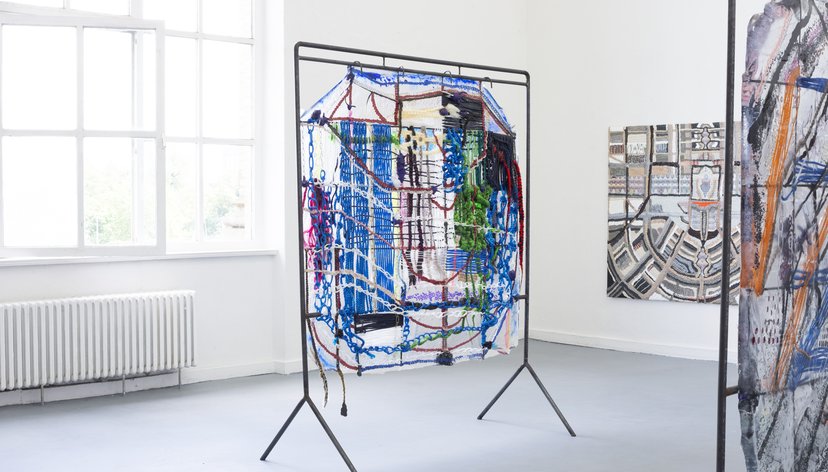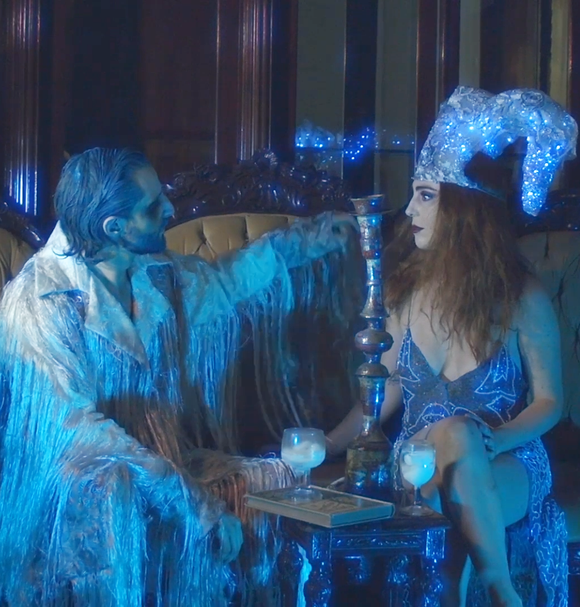
Key details
Date
- 16 February 2023
Read time
- 5 minutes
Paola Estrella (Contemporary Art Practice, 2021) is a multimedia artist who explores intimacy through hybrid creatures, myths and worldbuilding. Studying at the RCA she felt constantly challenged but was also given space to play, a balance which is now a part of her creative process.
Key details
Date
- 16 February 2023
Read time
- 5 minutes
Estrella’s videos were displayed at South London Gallery (SLG) as part of New Contemporaries 2022, where she also performed a live work.

Portrait of Paola Estrella by Anna Lena Krause
Could you talk us through the work you are exhibiting for New Contemporaries 2022?
Four of my videos were selected for New Contemporaries 2022, all of which were created during my time at the RCA. ‘Journey To The Underworld’ and ‘A Timeless Parallel’ are moving image projects that include worldbuilding and shift between physical and digital scenarios.
What these four projects have in common is that they emerge from a curiosity to understand intimacy with objects, places and people. I use fiction and storytelling to address contemporary issues and the role that the imagined has in the way we connect today.
“I constantly take inspiration from my RCA dissertation [...] which holds a framework of what intimacy with one-self means to touch on different aspects of the human experience.”
MA Contemporary Art Practice alumni
I constantly take inspiration from my RCA dissertation ‘Intimate Notes About Proximity’ which holds a framework of what intimacy with one-self means to touch on different aspects of the human experience.

You are doing a performance ‘La Loca’, at SLG, and recently took part in a cabaret event at Goldsmiths CCA. What draws you to creating live events?
Performance is a very challenging and vulnerable medium that has to do with exposing hidden layers. It’s very special to have the opportunity to be heard by an audience, this is part of what drives me to perform.
Incorporating performance into my practice felt like a very natural process since I am driven by what it means to have a body, especially in this digital era. I am interested in the duality between the power of the body to create agency and the fragility of existing within our skin.
In 2022, I presented ‘Glitter Panties’ in different settings, including Goldsmiths CCA; it is a performance about sexuality and intersectional feminism. In March 2023, I will be showing ‘La Loca’ for the first time at SLG. The performance is about connecting through rituals and intuition with dimensions that we can sometimes feel, but do not fully understand yet.

Your work encompasses video, performance, photography, painting and mixed media works. What does working across these different media offer?
My work has many layers. It can be playful, ironic and childish, and at the same time touch on very serious topics such as climate change, feminism and body politics. To me, it is not about the medium or the resources, it is about bringing ideas into this realm to exteriorize what I am visualising in the best way possible.
I need to have both freedom to experiment and technical control over the results. It is important for me to be constantly surprised by what I am making, which is one of the reasons why I really enjoy collaborating and working on multimedia projects.

There are some recurring motifs in your work like the bird and animal headed figures. What is the significance of these?
The imaginary plays a very important role in the way we understand reality. We somehow live between what’s real and can be proven and what we prioritise, dream and fantasise about, which always hold a certain level of fiction. This is why I am interested in surrealism and magic realism.
I use hybrid creatures, myths and worldbuilding to talk about the human experience, mainly about social issues related to identity, gender and sexuality. I create visual scenarios to touch on emotional and intimate subjects. I like to think that my work exists in multiple levels of reality which is why my projects can be read in many different ways.

You are based in London but are originally from Mexico City. How does the dialogue between these two places inform your work?
On one hand, I am very moved by the international community of artists in London. The art scene is very experimental and it is open to new ways of making. I just can’t get enough of it. On the other hand, Mexico is where I get most of my inspiration from. The folklore, the food, the mysticism, the traditions, the stories and the irony.
“I am very moved by the international community of artists in London. The art scene is very experimental and it is open to new ways of making.”
MA Contemporary Art Practice alumni
Living abroad has allowed me to understand my identity from different angles. I would say that the combination between what inspires me from my roots, and the exchanges that I have with different creators while living in London have shaped my practice.

Before coming to the RCA you studied BA Graphic Design and studied art direction and mixed media at Central Saint Martins. What drew you to MA Contemporary Art Practice (CAP)? Why did you choose the Public Sphere pathway?
I was drawn by the thinking behind the Contemporary Art Practice programme. I liked that tutors and peers didn’t try to fit my practice into a certain category or medium and instead pushed me to go deeper to find my own voice.
“I was interested in the conversations that were taking place in the pathway, in the versatility of my colleagues and in the flexibility that we had to jump between pathways and departments in CAP.”
MA Contemporary Art Practice alumni
The public and the private spheres, and the blurred limits between these, are very relevant to the main subject I work with which is intimacy. I was interested in the conversations that were taking place in the pathway, in the versatility of my colleagues and in the flexibility that we had to jump between pathways and departments in CAP.

How did your time on the programme shape and inform your practice?
I was very invested in the programme and took advantage of the resources to test different ways of communicating my ideas. I felt the environment offered a space for play, but at the same time, I was constantly being challenged. I adopted this formula and it is now part of my creative process.
“Most of our tutors were active artists who were very aware of the issues one faces when pursuing an art career and they knew the support I needed to keep going, this made me feel at home during my time there.”
MA Contemporary Art Practice alumni
Something I also enjoyed were the tutorials. Most of our tutors were active artists who were very aware of the issues one faces when pursuing an art career and they knew the support I needed to keep going, this made me feel at home during my time there.

While at the RCA you co-founded Diasporas Now. Could you talk a little about this experience and the importance of making these connections with peers?
Diasporas Now (DN) was founded in 2021 during one of the COVID-19 lockdowns. In collaboration with Lulu Wang and Rieko Whitfield, who were also students in CAP, we detected a need for an experimental space that represented creators from the Global Majority and performance artists.
DN began as an online streaming platform, but we later adapted it to different settings and needs. We constantly work with institutions that align with our vision such as ICA, SLG and Reference Point, we give workshops in academic settings, and we organise performance events in public spaces.
Across these multiple iterations, there has been a spirit of community, inclusion, and collaboration which has been not only nurturing, but also necessary for the artists that have been involved. Our ongoing growing audience has been actively participating in the conversations that take place during our events about different ways of understanding identity.

